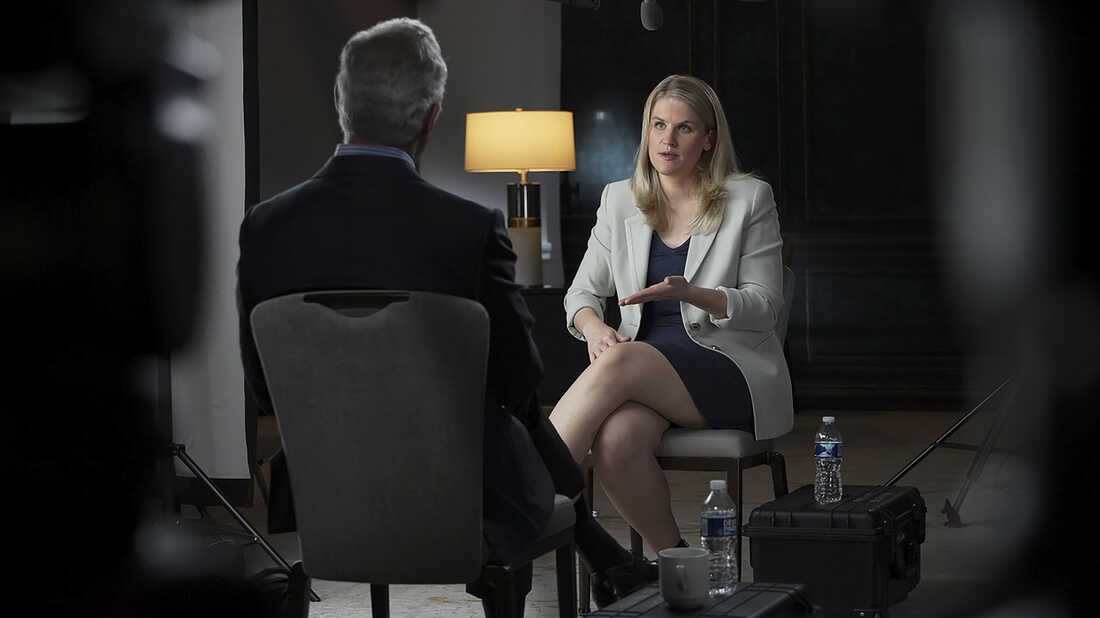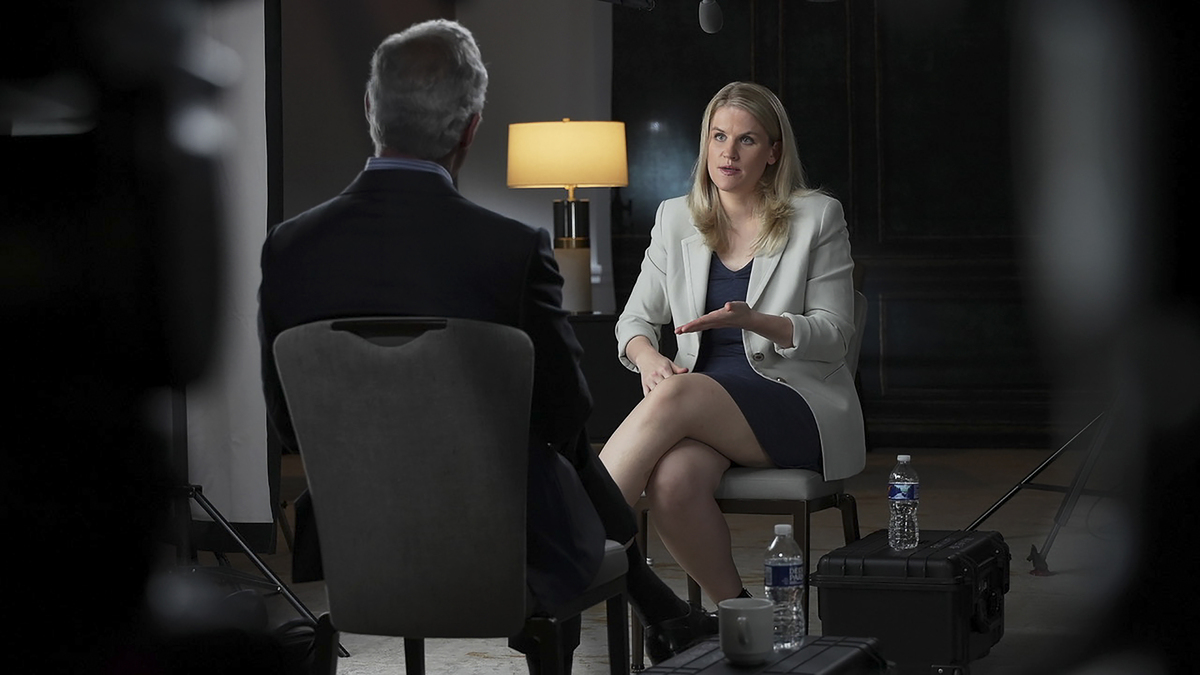
Facebook whistleblower Frances Haugen talks with CBS’ Scott Pelley on 60 Minutes, in an episode that aired on Sunday.
Robert Fortunato/CBS News via AP
hide caption
toggle caption
Robert Fortunato/CBS News via AP

Facebook whistleblower Frances Haugen talks with CBS’ Scott Pelley on 60 Minutes, in an episode that aired on Sunday.
Robert Fortunato/CBS News via AP
A data scientist named Frances Haugen has revealed herself to be the whistleblower behind a massive exposure of the inner workings at Facebook.
Prior to appearing on 60 Minutes on Sunday, Haugen, a former employee at the social media giant, kept her identity a secret after sharing thousands of pages of internal Facebook documents to the media and federal law enforcement.
Haugen’s testimony as well as the information she shared so far suggests the company deceived the public and its investors about its ability to deal with hate speech and misinformation on its platform.
“Facebook, over and over again, has shown it chooses profit over safety,” she said during the interview on Sunday.
Haugen’s document dump, her planned testimony in front of Congress this week, as well as an ongoing investigative reporting series into the company is potentially pushing Facebook into its biggest crisis yet. The negative spotlight also comes as Republicans and Democrats on Capitol Hill are increasingly scrutinizing Facebook’s actions.
The Facebook Files reveals major issues
Hours before Haugen’s interview aired, Facebook issued a lengthy statement from director of policy communications Lena Pietsch titled, “Missing Facts from Tonight’s 60 Minutes Segment.”
She pointed to Facebook’s investment to monitor for harmful content; disputed the way Facebook’s own research on teenagers’ mental health has been reported; and rejected the claim that the social network has furthered political polarization.
Recent reporting by The Wall Street Journal has Facebook already in the spotlight. Haugen shared thousands of Facebook documents with the newspaper that have gone into the creation of the Facebook Files series.
So far the paper has revealed how anti-COVID-19 vaccine information flourished on Facebook. It also showed how separate rules allegedly apply to celebrities and politicians on the site. Facebook allowed VIP users to, for a time, avoid penalties for bad behavior, according to the report.
Haugen has also detailed how she says Facebook quickly disbanded its civic integrity team — responsible for protecting the democratic process and tackling misinformation — after the 2020 U.S. election. Shortly after this, the Jan. 6 insurrection at the U.S. Capitol occurred, whose organizers used Facebook to help plan.
“I don’t trust that they’re willing to actually invest what needs to be invested to keep Facebook from being dangerous,” Haugen told 60 Minutes.
Remember Cambridge Analytica?
Facebook started in CEO Mark Zuckerberg’s Harvard dorm. Now it’s estimated to be worth $1 trillion. As it’s grown, so too have its controversies.
The company faced massive blowback from users, politicians, and regulators following the Cambridge Analytica debacle more than three years ago.
Another whistleblower named Christopher Wylie went public in 2018 exposing how millions of Facebook users’ personal data was accessed, without the users’ consent, by the U.K. firm Cambridge Analytica. The now-defunct firm used this information to attempt to influence several elections around the world, including the U.K.’s Brexit vote on leaving the European Union.
Three years later, Facebook, which has maintained no liability in the Cambridge Analytica dealings, walked away from the entire episode relatively unscathed. As part of a deal reached with the U.K. government, Facebook paid a £500,000 (about $643,000) fine.
In 2020, Facebook was yet again criticized for how it regulates political ads and misinformation on its platform, but no regulatory changes came of the criticism.
Lawmakers talk regulations
After the Haugen interview aired on 60 Minutes, Connecticut Sen. Richard Blumenthal shared on Twitter, “Facebook’s actions make clear that we cannot trust it to police itself. We must consider stronger oversight, effective protections for children, & tools for parents, among the needed reforms.”

Sen. Maria Cantwell, D-Wash., top left, speaks with Sen. Amy Klobuchar, D-Minn., as Antigone Davis, Facebook’s global head of safety, testifies virtually before the Senate Commerce, Science and Transportation Subcommittee on Consumer Protection, Product Safety and Data Security during a hearing on children’s online safety and mental health, Thursday, Sept. 30, 2021, on Capitol Hill in Washington.
Patrick Semansky/AP
hide caption
toggle caption
Patrick Semansky/AP

Sen. Maria Cantwell, D-Wash., top left, speaks with Sen. Amy Klobuchar, D-Minn., as Antigone Davis, Facebook’s global head of safety, testifies virtually before the Senate Commerce, Science and Transportation Subcommittee on Consumer Protection, Product Safety and Data Security during a hearing on children’s online safety and mental health, Thursday, Sept. 30, 2021, on Capitol Hill in Washington.
Patrick Semansky/AP
For years, Congress has been stuck in an ongoing debate over how best to regulate Big Tech–even as Facebook says its welcomes updated regulations.
In June, House lawmakers introduced sweeping antitrust reforms aimed at Amazon, Apple, Facebook and Google. The House Judiciary Committee approved the bills, but they have not been brought for a floor vote.
The scrutiny now facing Facebook could push lawmakers to act.
During a hearing last week lawmakers examined allegations that Facebook’s own internal research showed its platforms are negatively impacting the mental health of millions of mostly teenage girls.
“This is your company’s reporting. You knew this was there. You knew it was there, but you didn’t do anything about it,” said Sen. Marsha Blackburn, R-Tenn., the subcommittee’s ranking member, referring to internal documents about the prevalence of sex trafficking on Facebook.
Facebook has said the research was taken out of context.
Haugen contacted state officials and the SEC
Other regulatory agencies aren’t waiting for Congress.
In December 2020, the Federal Trade Commission filed an antitrust law suit against the company. In August, the commission amended that complaint to demand the company sell Instagram and What’sApp.
With these latest allegations, Facebook could soon be facing heat from other regulators.
Haugen and her attorney John Tye shared that she has filed at least eight complaints with the U.S. Securities and Exchange Commission.
These complaints focus on the prevalence of hate speech on Facebook, misrepresentations about the site’s role during the Capitol insurrection, and the danger facing children on the site.

FILE – In this Aug. 5, 2017, file photo U.S. Securities and Exchange Commission building in Washington.
Andrew Harnik/AP
hide caption
toggle caption
Andrew Harnik/AP

FILE – In this Aug. 5, 2017, file photo U.S. Securities and Exchange Commission building in Washington.
Andrew Harnik/AP
Tye, who spoke with NPR, said those allegations involve the difference between what Facebook knew about its platform and what it said publicly. He said misleading investors is a crime under U.S. securities law.
Haugen’s documents have also been shared with the state attorneys general for California, Vermont, Tennessee, Massachusetts and Nebraska, Tye told The New York Times.
It’s unclear whether the SEC or those state attorneys general plan to address Haugen’s complaints.
Editor’s note: Facebook is among NPR’s financial supporters.
NPR’s Bobby Allyn and Shannon Bond contributed to this report.








More News
‘Paper Mario: The Thousand-Year Door’ Sets the Standard for Classic Game Remakes
Top FTX Executive Sentenced to Seven and a Half Years in Prison
How Researchers Cracked an 11-Year-Old Password to a $3 Million Crypto Wallet